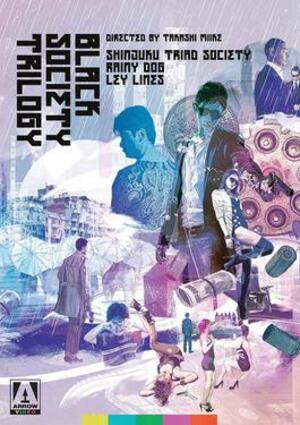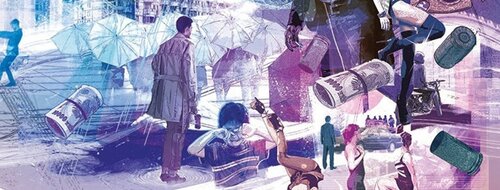-
Takashi Miike's Black Society Trilogy
Ladies and gentlemen,
I have finally managed to watch Takashi Miike's Black Society Trilogy which consists of the movies Shinjuku Triad Society (1995), Rainy Dog (1997) and Ley Lines (1999). The trilogy focuses on foreign gangsters who are trying to find a purpose in life. These three Japanese gangster movies show us outcasts that are fighting for acceptance. Each film combines melodramatic and philosophical elements with quite brutal action sequences and deviant eroticism in a very unique way. Takashi Miike breaks with traditional Japanese values and revolutionizes his country's cinema with this stunning trilogy that has finally been released in a boxed set in North America earlier this year. Find my detailed reviews for each movie below and make sure to watch these great movies.
Sincerely yours,
Sebastian Kluth

Shinjuku Triad Society (1995)
Shinjuku Triad Society was Takashi Miike's first movie that wasn't a direct-to-video release but that made it to Japanese movie theatres. It's also the first part of what would later become the Black Society Trilogy that focuses on gangsters living in foreign countries. This film is also a movie that establishes many trademarks that can be found in numerous Takashi Miike movies until today such as having controversial anti-heroes as protagonists, focusing on a slightly depressing, melancholic and at times surreal atmosphere and including a lot of cold-hearted violence including several anal rape scenes between both homosexual and heterosexual partners, an eyeball being ripped out of an old woman's face and a police officer that nearly gets beaten to death in this particular case. This movie shows the ugly sides of life and how each and every single human being has some serious flaws. Takashi Miike's movie aren't for the faint-hearted but that what makes them so unique after all.
It has also become a trademark that many of Takashi Miike's movies feature numerous characters and are at times difficult to follow. This is also the case here and it might take about half an hour to figure out who is who and on whose side. You patience will be rewarded with a movie that is equally entertaining and profound.
The movie shows how a Chinese-born Japanese police officer who isn't fully accepted by either society tries to take care of his old parents who have failed to integrate into Japanese society, protect his younger brother who gets involved as a lawyer for a local triad group and hunt down a homosexual Taiwanese-born gangster boss who is specialized in organ trafficking. The movie shows us flawed but very profound characters who are trying to find a way to be accepted and have a decent life but struggle to succeed in one way or another. This film is a brutal action movie and a suspenseful gangster thriller but also a thought-provoking drama. Despite the depressing settings and the desperate main plot, Takashi Miike also includes a few moments that lighten things up such as his absurd and black humour but also some short moments of compassion between the main character and his parents, a prostitute and his brother.
Shinjuku Triad Society is a charismatic masterpiece in Takshi Miike's early career that already shows how unconventional and unique his approach to film-making was back then. This movie's brutal, direct and gloomy attitude breaks several taboos in traditional Japan and that's why this film has developed a cult following among younger audiences over the years. If you like twisted dramas, gangster movies and neo-noir cinema, you should not only watch this outstanding movie but the entire Black Society Trilogy that has recently been released in North America with a detailed booklet, analytical commentary and exclusive recent interviews.
9/10
Rainy Dog (1997)
Rainy Dog is the second film in Takashi Miike's Black Society Trilogy that focuses on foreign gangsters with inner struggles that are trying to find a purpose in life. Despite a similar topic, Rainy Dog is very different from the first film Shinjuku Triad Society.
The first movie focused on Chinese-born Japanese gangsters and police officers that were fighting each other in Tokyo's flashy suburb. This movie here focuses on a Japanese gangster who had to leave the country and settle in Taiwan after committing a crime.
While the first movie focuses on a more complex plot, includes numerous characters and relies on quite brutal action sequences, this second film is almost an antithesis of the predecessor. Rainy Dog focuses on the solitary main character who works as a hit-man for a local gangster boss after his Japanese boss got killed in his absence. He ultimately tries to run away from his depressing everyday life. The solitary main character is followed by a mute boy that was dropped at his desolate dwelling by a woman the main character had sexual intercourse with many years ago but whose name he doesn't even remember and who claims that he is his son. This unusual duo teams up with a prostitute that wants to start a new life. The trio gets tracked down by three parties: another Japanese hit-man who was asked to avenge the crime that forced the main character to leave his home country, the friends and family members of a guy the main character executed in Taiwan and even the Taiwanese gangster boss the main character was working for in the beginning of the movie that decided to betray him.
Rainy Dog is a quite revealing title because the main character and those who follow him behave, feel and run way like beaten dogs. In addition to this, it's almost constantly raining throughout the entire movie which adds to the desperate, melancholic and monotonous tone of the movie. Most scenes are set on abandoned beaches, in dark back alleys, in muddy forests and in small impersonal dwellings. This lethargic atmosphere is a little bit harder to digest than the vivid predecessor but it gives the film a very own style. The minimalist acting, the short dialogues and the desolate landscapes only add to this unique approach. The acting performances might be restricted at first sight but that was clearly the director's intention and it's actually quite interesting how the emotionless main character very slowly opens up to not only accepting but even feeling sympathy for the boy that might be his son and the prostitute that is his soulmate.
The gloomy atmosphere from start to finish leads to a very fitting ending that you wouldn't get in a Hollywood movie and that even some of the actors involved disliked as you can hear and see in the additional interview included on this disc of the Black Society Trilogy package that has been released earlier this year. Personally, I really liked this movie's conclusion.
In my opinion, Rainy Dog convinces with its profound atmosphere and three main characters that are as flawed as they are fascinating. The downside of the movie is its plot that is average at best and the mostly static action sequences that fail to add some much-needed punch to the lethargic movie. Fans of original Yakuza flicks and director Takashi Miike should give this film a try. Occasional fans of gangster movies can skip the second part of the Black Society Trilogy.
7/10
Ley Lines (1999)
Ley Lines is the third and last instalment in Takashi Miike's Black Society Trilogy that focuses on foreign gangsters with inner struggles trying to find a purpose in life. Ley Lines both shares similarities and differences with Shinjuku Triad Society and Rainy Dog. Despite overall positive critics, I think this movie is the weakest part of the trilogy even though it's still slightly above average.
Just as the first film, Ley Lines focuses on Chinese-born Japanese that have to face a lot of prejudice and racism which is made clear right from the start in a beautiful and surreal opening sequence. Just like in the second movie, the main characters team up with a prostitute that is also looking for a purpose in life. The main characters clash with local gangsters that also have a foreign background which is also typical for the trilogy.
On the other side, Ley Lines focuses on three characters instead of a lone wolf. It tells the story of two brothers and their school friend who leave the countryside on a train and hope to become rich, famous and accepted in Tokyo. Upon arriving, they get tricked and robbed by a prostitute but she gets beaten up by her pimp and crosses the path with the trio again and decides to accompany and help them this time. The trio first sells petroleum-based inhalant toulene for a weird local low-level criminal. When they realize that they are still living like outcasts, they plan on moving illegally to Brazil on a cargo ship. In order to finance such a resettlement, they rob a local gangster clan that chases them down until the final showdown at the port.
Ley Lines has a few brutal and explicit scenes like the other two movies, for example when the prostitute gets beaten up by her pimp and when she has to serve two weird clients which are events that convince her to change her profession, life and identity. On the other side, the film has some situation comedy as well. The brothers' friend is weird, overenthusiastic and eccentric which adds a lot of humour and pace to the film but also feels somewhat exaggerated and redundant at times. The prostitute is also quite quirky and has sexual intercourse with all members of the trio to cheer them up which is portrayed in a surprisingly neutral way as this doesn't provoke any conflicts between the four characters.
The film is overall less brutal and intense than the first movie and less melancholic and solitary than the second instalment. It's somewhere in between those two films and feels directionless at times when weird situation comedy and uplifting moments are followed by rather depressing or boring sequences. Despite a few solid ideas like showing the constant shift of ups and downs in the lives of the three outsiders, Ley Lines is somehow missing its own distinctive identity and has a few minor lengths.
In conclusion, Ley Lines is still a slightly above average movie and if you have watched Shinjuku Triad Society and Rainy Dog, you won't regret watching this third and last part of the Black Society Trilogy either. If you haven't watched the other two films, there are numerous other Japanese gangster movies of much better quality you should watch first. Let me suggest you Another Lonely Hit-man, Gozu and Outrage.
6/10
 « Short Easter Road Trip - Day Four: Barrie - GatineauShinjuku kuroshakai: Chaina mafia sensô / Shinjuku Triad Society (1995) - Takashi Miike's early masterpiece - 9/10 (27/04/17) »
« Short Easter Road Trip - Day Four: Barrie - GatineauShinjuku kuroshakai: Chaina mafia sensô / Shinjuku Triad Society (1995) - Takashi Miike's early masterpiece - 9/10 (27/04/17) »









